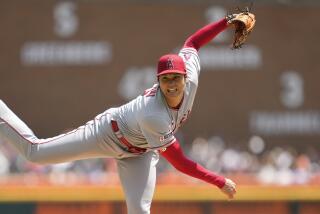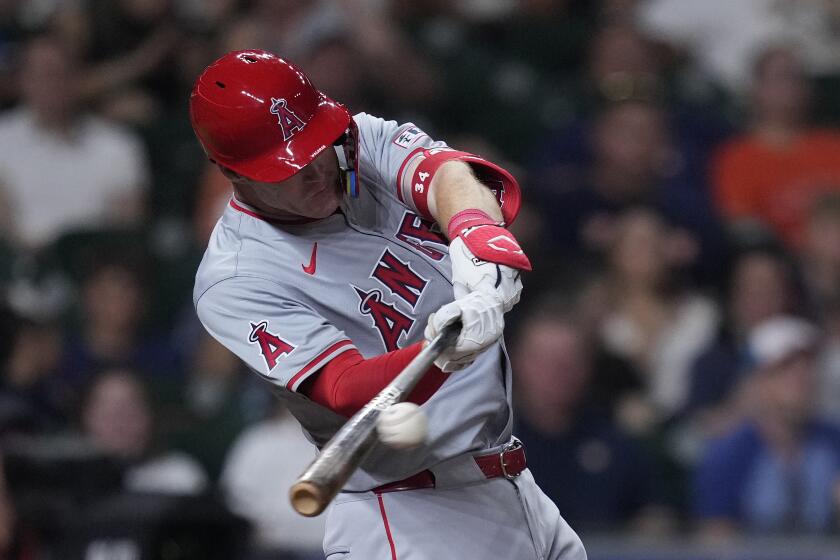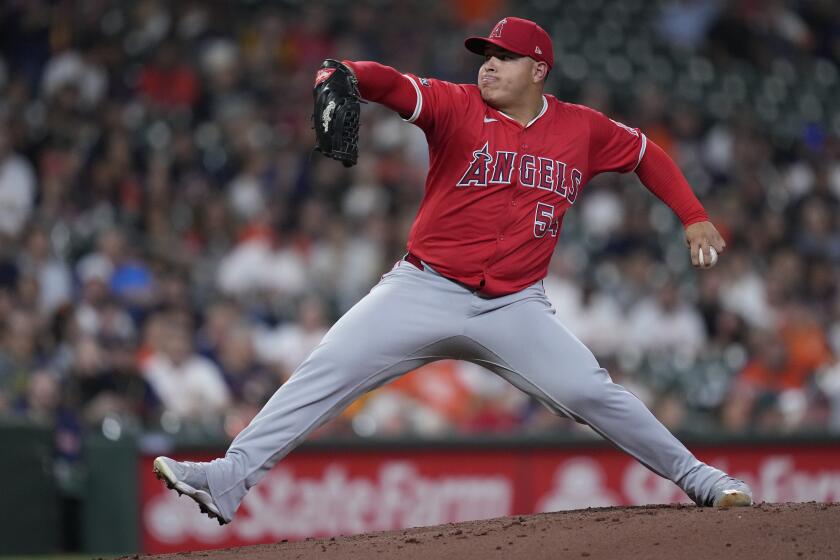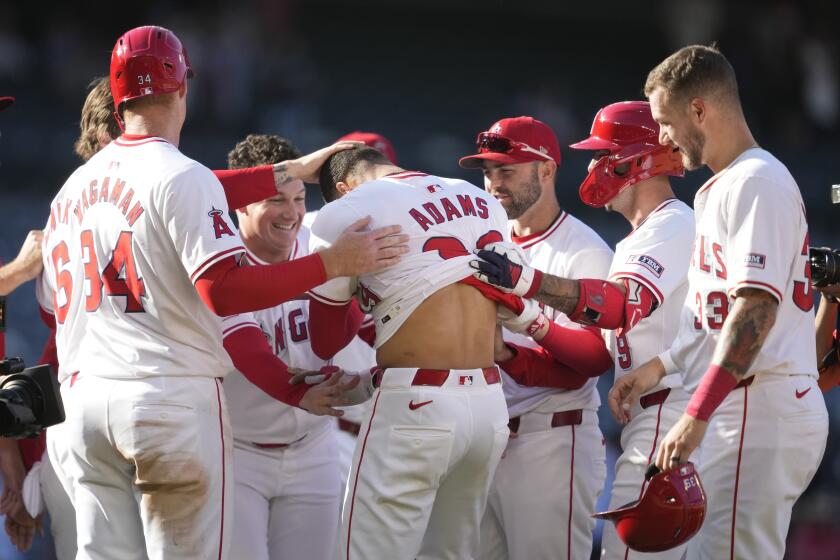Loves Me, Loves Me Not....
I am paging through the cluttered scrapbook of the mind, visualizing special moments and personalities.
It is suggested by the editors that 40 years of covering baseball is an appropriate milestone at which to reflect on why the game endures.
What is it that sparks the imagination and starts the turnstiles purring again each spring despite all the misery and negativity--the whining players, the soaring salaries, the unrestrained owners, the rising ticket prices, the inevitable labor problems between a union and management that can’t decide how to divide more than $3 billion in revenue.
It would seem so easy to stay away, to concede that Shakespeare had it right when he wrote, “a plague o’ both your houses.”
Instead, the fans have been coming in record numbers at both the major and minor league levels, attracted by poor pitching and games that last until midnight, paying premium prices so that the kids can hear the guy sitting next to them chant “Yankees suck!” while spilling his $6 cup of beer on them.
So, what is the answer?
What is it that prompts us to retain a certain romanticism about a game that shed its innocence long ago?
Why does it endure? What draws us back?
The answer, of course, is that there is no one answer because the question is far too personal.
Strip away the greed, the money, the sport as business, and we are each likely to uncover an Iowa cornfield somewhere in our roots--be it urban playground or rural sandlot.
Strip away the mercenary, and we each have our own history, emotions, attachments--and scrapbook.
I am the son of the father who would find seats for us in the last row of the upper deck at now-demolished Wrigley Field for Sunday doubleheaders when the Los Angeles Angels were home and the major leagues were too far away to even think about and I hated the Hollywood Stars and doted on the Pacific Coast League exploits of Angels named Gene Baker and Frankie Baumholtz and big Steve Bilko, of course, and my father would say, “Yes, but you should have seen Jigger Statz and Truck Hannah and some of those Angels of the past.”
I am also the father of the son who may have figured that the only way to communicate with his dad was through baseball and who has now played in the major leagues for the San Diego Padres and Philadelphia Phillies and whose travels through minor league ballparks in such places as Modesto and Visalia and Huntsville, Ala., have served to temper the father’s press box cynicism and been a reminder that the grass-roots atmosphere still exists and that there are hundreds of young players out there still chasing a dream and partially paying for it out of their own pocket because the owners have to cut back somewhere for all those major league millionaires and who cares if the kids they hope will restock their major league club get there on Quarter Pounders?
Baseball endures because the scrapbooks provide a mosaic of who we are and where we’ve been, as individuals and country, and if that’s too idyllic, too corny, then try erasing 100 years of Babe Ruth and Home Run Baker, of Murderers’ Row and the Gashouse Gang, of Connie Mack and John McGraw, of Stan the Man, Joltin’ Joe and Teddy Ballgame, of Jackie Robinson and Larry Doby, of Satchel and Buck O’Neil, of Bobby Thomson and Bucky Dent, of Sparky and Tommy, Henry and Reggie, Cal and Lou, Sandy and Big D, Orel and Darryl, Mark and Sammy, Nolan and Rolen, Nomar and A-Rod and, of course, Willie, Mickey and the Duke.
We sing songs to baseball, know it on a first-name and nickname basis, pay homage to places named Cooperstown and Williamsport, argue over players, teams and eras, and pick up our teeth and keep coming back every time there’s a work stoppage, every time there’s another debate over how much is too much.
No other sport produces as much controversy and conversation, strategy and second-guessing. No other sport has had a longer hold on our emotions--from the long-suffering faithful of New England to the loyalty-tested Dodger fans amid the chaos under Fox.
No other sport has experienced a revival to match baseball’s since the death knell that was the cancellation of the 1994 World Series and the labor dispute of 1994-95--thanks in large measure to Cal Ripken Jr.’s pursuit of Lou Gehrig’s record for consecutive games and the home run exploits of Mark McGwire and Sammy Sosa. Revenue has almost doubled since ‘94, and attendance eclipsed a record 73 million last year. The commissioner may talk of the lost hope in too many cities because of the revenue and competitive disparity, but in reality it’s a golden age of talented players--unmatched, perhaps, in any era.
Certainly, there has never been a greater array of shortstops, among them Alex Rodriguez, Derek Jeter, Nomar Garciaparra, Omar Vizquel, Miguel Tejada, Rey Ordonez, Barry Larkin, Edgar Renteria, Alex Gonzalez and Deivi Cruz. Arguably, there has never been a greater array of power hitters, among them McGwire, Sosa, Ken Griffey Jr., Barry Bonds, Frank Thomas, Chipper Jones, Jason Giambi, Mo Vaughn, Vladimir Guerrero, Mike Piazza, Gary Sheffield and the $252-million Rodriguez. Pitching depth may be limited, but Pedro Martinez, Randy Johnson, Greg Maddux, Tom Glavine, Roger Clemens, Mike Mussina, Orlando Hernandez, Curt Schilling and Kevin Brown are among those who would be winners in any era, and a promising group of young pitchers, including Chan Ho Park, Darren Dreifort, Tim Hudson, Barry Zito, Ben Sheets, Ryan Dempster, Brad Penny, A.J. Burnett and C.C. Sabathia may soon emerge with their own page in the scrapbook.
There is not just one moment, one memory, that illustrates baseball’s grip, but I certainly remember the World Series electricity of Carlton Fisk in the midnight hour at Fenway Park and Reggie Jackson in the madhouse of Yankee Stadium on the night he hit three homers on three consecutive pitches from three different Dodger pitchers and I remember how a limping Kirk Gibson turned around the 1988 World Series and how many times I sat on the edge of a seat waiting for Nolan Ryan to give up his first hit and I still feel my vibrating nerve ends after I left the press box to get a fast start toward Fenway’s cramped clubhouses in the twilight of Oct. 2, 1978, and I stood amid the praying, pleading, disappointed crowd as Goose Gossage got Carl Yastrzemski to pop up for the dramatic final out of the Yankees’ 5-4, division-clinching playoff victory over the Red Sox, the game won on the improbable home run by Bucky Dent.
I can also still see the numbing grip of baseball on the face of Gene Mauch as we sit on the patio of his Rancho Mirage home and he talks about the demons and the decisions that deprived him of a trip to the World Series when he seemed so close with Philadelphia in 1964 and the Angels in 1982 and ’86 and this lifelong baseball man, one of the brightest and best, insists he retired with the certainty that his moves were the right moves, that he was never beaten by an opposing manager, that any other manager would have had difficulty getting the Phillies and Angels in position to be disappointed and no, he is not tormented by the failures because he had too many wonderful times in those years before the music stopped, “working my butt off and enjoying every minute of it in the game I loved,” and I thought of Bill Rigney and Walter Alston and Tom Lasorda, among the other managers I have traveled with and covered and who also shared their insights and passions, helping to explain the game and explore its nuances, strengthening its grip.
It has long been said that the game itself is so good that it will always survive the attempts to kill it by people responsible for preserving it. Mauch’s affection was damaged over time by the influx of corporate ownership and the influence of the players’ union. Nevertheless, a satellite still brings the games into his living room and he still marvels at the way Pedro Martinez turns hitters to dust, still edges forward when Tony Gwynn bats against Greg Maddux, still ponders whether the manager should send the runner on a 2-and-0 count, down by a run in the late innings.
No game is more simple or more complex. No game provides the fan with more opportunities to think along with the manager. No game provides more one-on-one matchups within a team concept or more opportunities for the unexpected during a six-month season.
If the focus now seems to be more on net worth than net value, when hasn’t money been an issue? The numbers may be more startling now, but check out the holdouts of Babe Ruth, Joe DiMaggio, Sandy Koufax and Don Drysdale. As much as things change, they remain the same. The game is handed from one generation to another, as if an heirloom. One scrapbook replaced by another.
So, a reporter asks the son if he ever thought of becoming a baseball writer like his dad instead of a player and he says, “No, because I heard him scream and cuss at the computer too many times,” and there is truth in that, just as there have been times, in print and out, when I may have screamed and cussed at and about the game in an attempt at constructive caring during a 40-year attachment that began years earlier in the last row of the upper deck at old Wrigley Field, sitting with the son’s grandfather, hearing stories about the game and players in the old days.
*
Editor’s note: Ross Newhan will be inducted into the Baseball Hall of Fame in Cooperstown, N.Y., in August.
More to Read
Go beyond the scoreboard
Get the latest on L.A.'s teams in the daily Sports Report newsletter.
You may occasionally receive promotional content from the Los Angeles Times.




